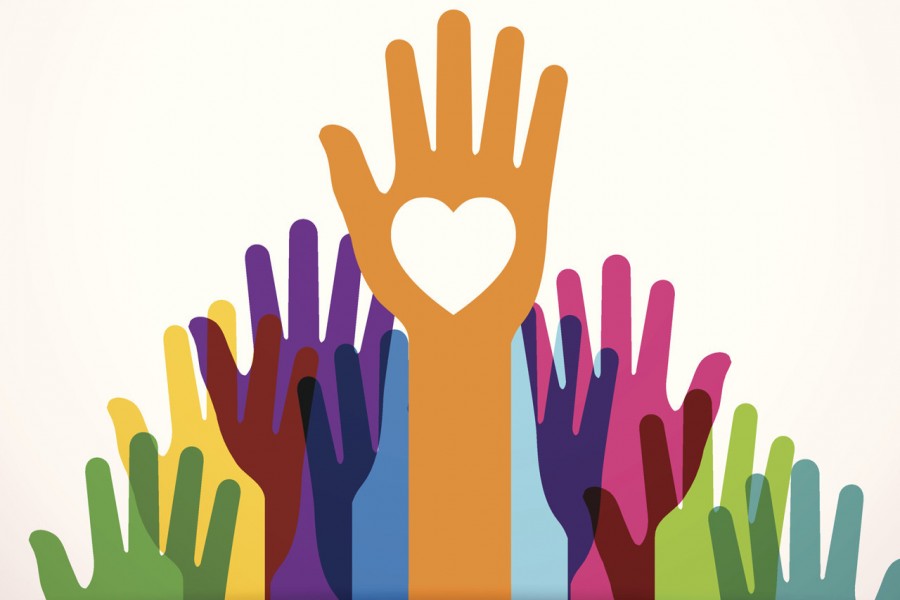For us in Bangladesh, the coronavirus pandemic has forced certain thoughts on to the table. Or call them lessons, those we perhaps have learned from a crisis which rages on, with little sign of any retreat anytime soon.
It emphasises the need for philanthropy to take hold in our society, for the affluent to come forward in ameliorating the pains of those who have not only been infected by the pandemic but, more broadly, those who have lost their jobs. The unfortunate truth for us is that the old idea of philanthropy, a theme which once was a significant segment of social care in our part of the world, has gone missing. RP Saha is memory. To be fair, there are the unassuming servants of humanity who, without fanfare or craving for publicity, have been doing a creditable job in coming to the aid of the helpless. But they are no more than a handful.
One would have expected such sectors of business as the garments industry to step up to provide succour to those in the bottom rungs of society. But that has not happened and the intriguing picture that has emerged is one of the garments sector itself seeking hand-outs from the government. The truth is obvious, which is that where one would have expected philanthropists, in good number, to emerge from business, one has come up with quite a blank. Where has all that accumulated affluence gone?
Philanthropy, then, is the idea the pandemic has underscored in these dark times. And then comes that other lesson, this one having to do with the work of government itself. We speak of social security. The pandemic has highlighted the grave need for an expansive social welfare system, one that can cater for the kinds of people whose lives have gone haywire owing to a sudden loss of jobs. The social safety network, especially for the poor classes as well as middle classes, ought from here on to be a priority for the government.
Given that in recent years the nation's Gross Domestic Product (GDP) has been in the ascendant, that we are repeatedly informed of the progress the economy has been making, it should be for the government to focus on ensuring that in times of crises, every citizen will be taken care of. Future budgets, beginning with next year's, should focus on substantive social security.
The coronavirus should in effect be a return to basics. In the rural regions of the country, to which thousands of families have made their way in the aftermath of the crisis, the idea of cooperatives ought to take hold. For families in Bangladesh, almost all of whom have roots in villages, the pandemic could be a pointer to what could be done in future through promoting collective cooperation in the production of agricultural goods.
While the pandemic has brought home to citizens with homes in villages the lesson that they need to have a fall-back situation through growing vegetables and therefore providing for themselves, it has also been educative in bringing home the idea of the community spirit. A crisis always brings people together. And a crisis such as the one we are confronted with today calls for a collective economic approach to the issues. Collectivisation, in a very social sense, could be dwelt upon in light of what we are going through.
The pandemic has in certain instances brought about new approaches to certain aspects of life. Online purchases of essential items in urban areas have been taking hold, which again is a mark of the wonders digitization can bring about. It is a point which should also be stressed in the villages and small towns of the country. The coronavirus will not be going away anytime soon, which is why the digital approach to everyday living assumes importance. The darkness of the present ought as well to be a readiness to face emergencies in the future.
The times are not what they were in 1943 or 1974, when government and society were limited to planning distributions of scarce resources among ever-widening crowds of the needy. Millionaires are there in plenty in the country, people who have annually convinced the powers that be to whiten their black money in unprecedented fashion. Such segments of society, insofar as the government is concerned, should henceforth be put on a leash. They have not helped the hapless in these coronavirus conditions. A parasitical economy is an ugly thought.
The pandemic is a wake-up call. It is a warning that unless corruption is punished, unless money laundering is checked, unless corrupt politicians and bureaucrats are called to account for their purchases of homes abroad, we do not and will not move into the future with ease.
Overall, the pandemic has taught us that people matter, that their lives and livelihoods matter. It has humbled society into staring at its own self-deceptions.
It has reminded us all that government ought to be a thriving, throbbing enterprise; and that it can be that when it informs citizens that they are not helpless when the lights begin to go out.
Syed Badrul Ahsan is a senior journalist and writer.
[email protected]


